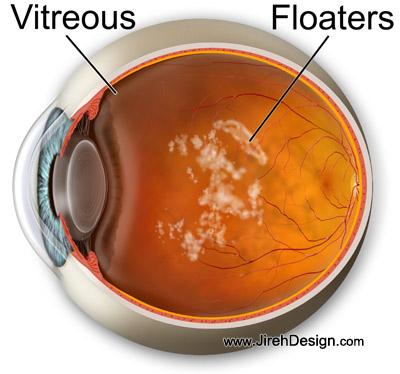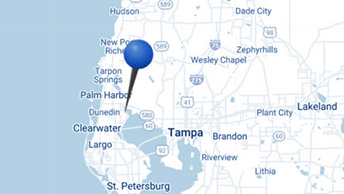Floaters in the eye. What are they?
Floaters are little cobwebs shapes or specks that float around in your field of vision. Eye floaters are small, dark, […]


Floaters in the eye. What are they?
Floaters are little cobwebs shapes or specks that float around in your field of vision. Eye floaters are small, dark, […]
Floaters are little cobwebs shapes or specks that float around in your field of vision.

In most cases, floaters are part of the natural aging process and simply an annoyance. They can be distracting at first, but eventually tend to settle at the bottom of the eye, becoming less bothersome.
Although floaters usually come to a rest below the line of sight, they do not go away completely. Most people have floaters and learn to ignore them. They are usually not noticed until they become numerous or more prominent. They can suddenly appear when looking at something bright, such as white paper or a blue sky.
Floaters develop when the vitreous, a gel-like substance that fills about 80 percent of the inside of the eyeball and helps maintain its round shape, slowly shrinks. As the vitreous shrinks, it becomes somewhat stringy, and the strands can cast tiny shadows on the retina. These are floaters.
Eye floaters are more likely to develop as we age and are more common in people who are very nearsighted, have diabetes, or who have had a cataract operation or other eye surgeries. There are other, more serious causes, including infection, inflammation, bleeding, retinal tears, and injury to the eye.
Sometimes a section of the vitreous pulls the fine fibers away from the retina all at once, rather than gradually, causing many new floating spots to appear suddenly. This is called a posterior vitreous detachment or PVD.
Click here to watch a vitreous detachment movie
In most cases, PVD is not sight-threatening and requires no treatment. However, a sudden increase in floating spots and shadows, possibly accompanied by light flashes or side (peripheral) vision loss, could indicate a retinal detachment.
A retinal detachment occurs when any part of the retina, the eye’s light-sensitive tissue, is lifted or pulled from its normal position at the back wall of the eye. A retinal detachment is a serious condition and should always be considered an emergency. If left untreated, it can lead to permanent visual impairment within two or three days or even blindness in the eye.
Those who experience a sudden increase in floaters, flashes of light in peripheral vision, or a loss of peripheral vision should have an eye care professional examine their eyes as soon as possible.
Treatment for floaters
For people who have small floaters that are simply an intermittent annoyance, treatment is not usually recommended. On some occasions, floaters can be so dense and numerous that they significantly affect vision or daily activities. In these cases, a vitrectomy, a surgical procedure that removes floaters from the vitreous, may be needed. A vitrectomy removes the vitreous gel, along with its floating debris, from the eye.
The vitreous is replaced with a saline solution. This will create a crystal clear view without the cloudy floaters. The eye will then replace the saline solution with natural eye fluid (aqueous) in 48 hours.
Like all eye surgery, this procedure has some risks because of possible complications, which include retinal detachment, retinal tears, infection and cataract. Eye surgeons used to be reluctant to recommend this surgery, however, new techniques and surgical equipment has significantly reduced the incidence of post-operative complications from vitrectomy and it is now a viable solution to clear visually disabling vitreous floaters.







